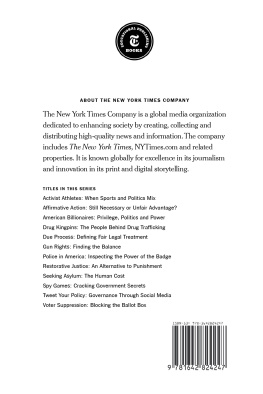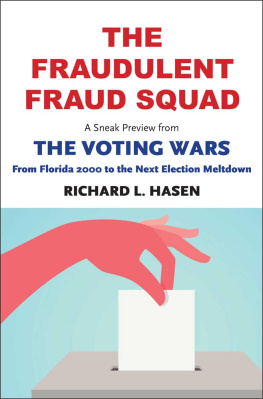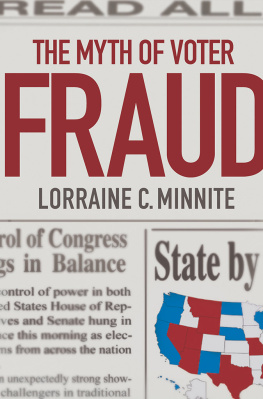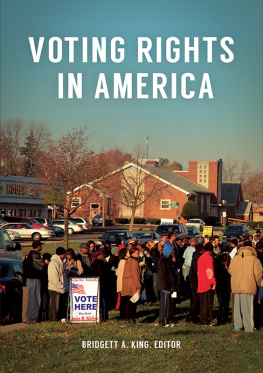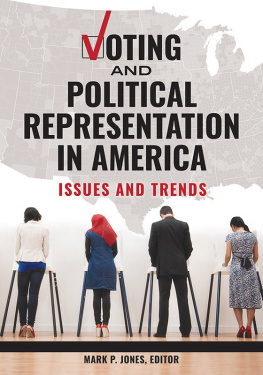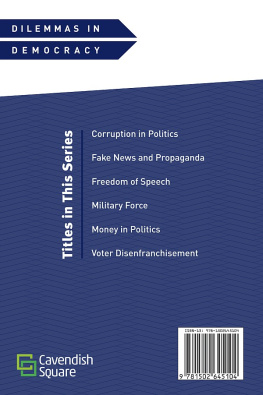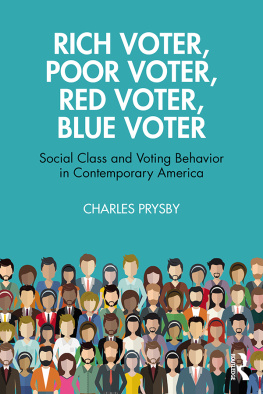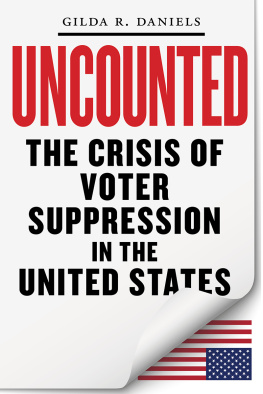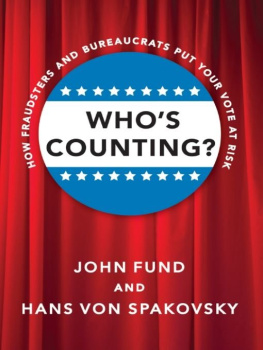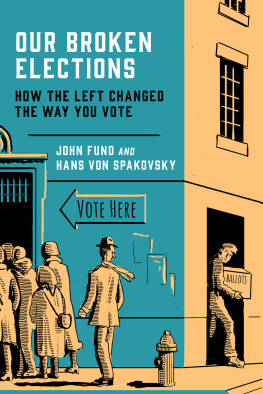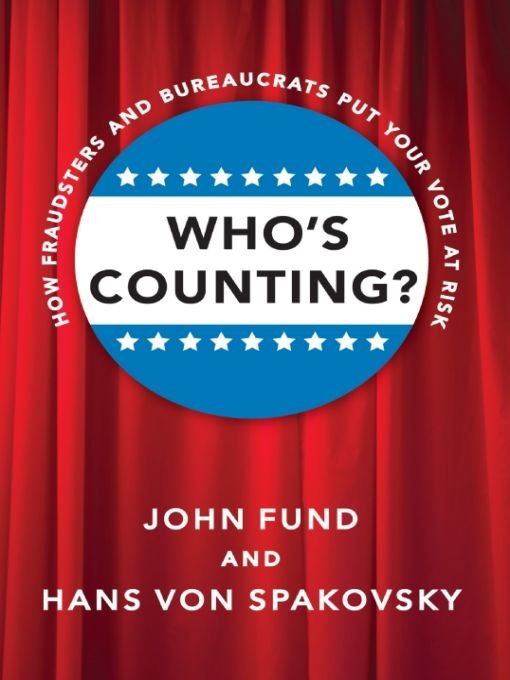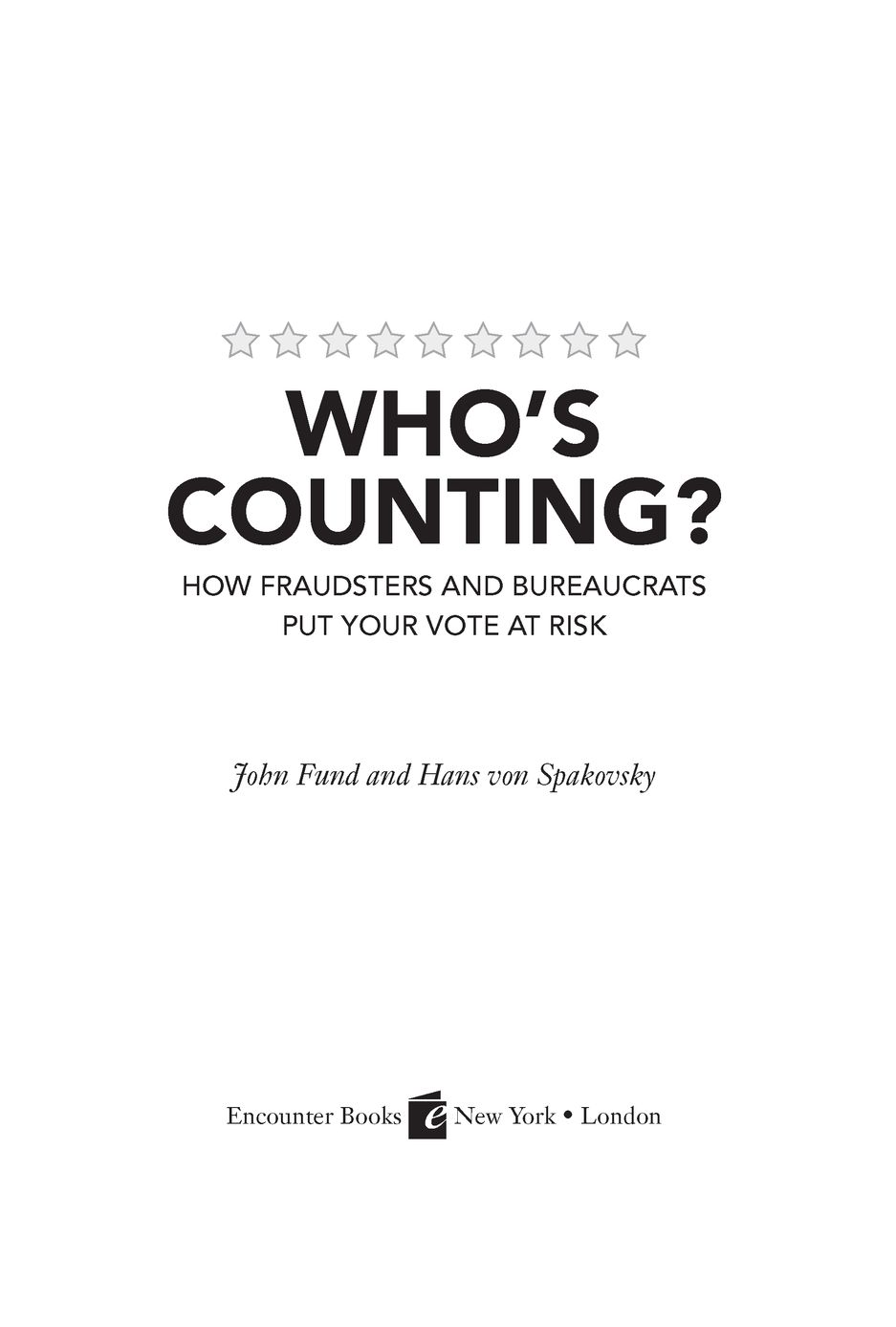Table of Contents
To my family, the source
for my curiosity and strength.
John Fund
This book is dedicated to my parents,
Anatol and Traudel von Spakovsky, immigrants to
the United States who were true Americans.
Hans von Spakovsky
Introduction
Come November 2012 we may be on the brink of repeating the 2000 Florida election debaclebut this time in several stateswith allegations of voter fraud, intimidation, and manipulation of voting machines added to the generalized chaos that sent the BushGore race into overtime.
There is still time to reduce the chance of another electoral meltdown, both this year and in future years. But this will not happen unless we acknowledge that the United States has a haphazard, fraud-prone election system more befitting an emerging Third World country than the worlds leading democracy.
With its hanging chads, butterfly ballots, and Supreme Court intervention, the Florida fiasco compelled this country to confront an ugly reality: that we have been making do with what noted political scientist Walter Dean Burnham has called the modern worlds sloppiest electoral systems.
Just how sloppy was demonstrated in February 2012, when the Pew Center on the States found 1.8 million names of deceased persons still registered to vote on state rolls. Roughly 2.75 million people are registered to vote in more than one state. The study found altogether that 24 million voter registrations13 percent of the nations totalcontained major inaccuracies or were otherwise invalid. Thats a lot of room for confusion or mischief.
With the demise of most big-city political machines and the rise of election supervision by nonpartisan civil service employees, concerns about honest and accurate election counts receded. But Dr. Larry J. Sabato, the director of the University of Virginias Center for Politics, who cowrote a pioneering book on the subject, Dirty Little Secrets: The Persistence of Corruption in American Politics, warned as early as the 1990s that voter fraud is making a comeback. As he testified before Congress after the Florida debacle: When we look at the registration system and voting process we have to balance two conflicting values; one, the goal of full and informed participation of the electorate, and two, the integrity of the system. To the extent that we keep expanding the participation rate and make it easier and easier for people to register and vote, we almost certainly increase the chances for voter fraud. So, in a sense it is a tradeoff. To move completely in the direction of one value as opposed to the other is foolhardy.
My strong suspicionbased on scores of investigated and unexplored tips from political observers and interviewees over the yearsis that some degree of vote fraud can be found almost everywhere, and serious outbreaks can and do occur in every region of the country. Whether fraud is Democratic or Republican, or located in the North or the South or the West, the effect on American democracy is similar. While electoral hanky-panky affects the outcome in only a small proportion of elections [mainly in very tight races], one fraudulent ballot is one too many for the integrity of the system and the confidence that the people have in the system. The need for reform is urgent and clear. Voter turnout in the United States is traditionally too low, and cynicism among citizens too high, to permit the malodorous malady of election fraud to continue uncheckedor to spread.
The 2000 recount was more than merely a national embarrassment; it left a lasting scar on the American electoral psyche. A Zogby poll a few years ago found that 38 percent of Americans still regarded the 2000 election outcome as questionable. Many Republicans believe that Democratic judges on the Florida Supreme Court tried to hand their state to Al Gore via selective partisan recounts and the illegal votes of felons and aliens. Many Democrats feel that the justices of the U.S. Supreme Court tilted toward George Bush, and they refuse to accept his victory as valid. But this issue transcends red-state-versus-blue-state partisan grievances. Many Americans are convinced that politicians cant be trusted to play by the rules, and either will commit fraud or intimidate voters at the slightest opportunity.
Indeed, the level of suspicion has grown so dramatically that it threatens to undermine our political system. A Fox News poll taken in April 2012 reported that 34 percent of voters believe supporters of voter ID laws are trying to steal elections by keeping eligible voters away from the polls. But more people50 percentthink opponents of the laws are acting in bad faith by trying to increase participation from ineligible or illegal voters.
Such attitudes can create a toxic brew. The United States ranks 139th out of 163 democracies in the rate of voter participation. If this escalates, were in horrendous shape as a country, says Curtis Gans, who runs the Center for the Study of the American Electorate at American University. If election results are followed by lawsuits, appeals, fire, and counterfire, many people who are already saying to hell with the process are going to exit. The more that voting is left to the zealous or self-interested few, the more we see harshly personal campaigns that dispense with any positive vision of our national future.
A Rasmussen Reports poll taken for this book found that both interest in and concern about voter fraud is high. Nearly two-thirds of Americans reported they were following news reports about voter fraud closely or somewhat closely. When asked how serious a problem it is, 64 percent said very serious or somewhat serious. Interestingly, the highest levels of concern came from African Americans (64 percent) , conservatives (85 percent), and those earning under $20,000 a year (71 percent). When it came to remedies, an astonishing 82 percent of respondents supported requiring that voters prove their identity before voting. The lowest support across demographic groups was still sky-high: 67 percent of African Americans, 67 percent of Democrats, and 58 percent of professed liberals all backed having people prove who they say they are as a condition of voting.
The Supreme Court is in agreement with the majority. In a unanimous decision reinstating Arizonas voter identification law in 2006, it stated:
Confidence in the integrity of our electoral processes is essential to the functioning of our participatory democracy. Voter fraud drives honest citizens out of the democratic process and breeds distrust of our government. Voters who fear their legitimate votes will be outweighed by fraudulent ones will feel disenfranchised.
Confusion and claims of fraud are again likely this time around, especially if the election is as close as it was in 2000. Can the nation take another Florida-style controversy?
Indeed, we may be on the way to turning Election Day into Election Month (or Election Year) through a new legal quagmire: election by litigation. Every close race now carries with it the prospect of demands for recounts, lawsuits, and seating challenges in Congress. Were waiting for the day that pols can just cut out the middleman and settle all elections in court, jokes Chuck Todd, former editor of the political tip sheet The Hotline. Such gallows humor may be entirely appropriate, given the predicament we face. Much as the battle over the Supreme Court nomination of Robert Bork changed, apparently forever, the politics of judicial appointments, the 2000 election may have marked a permanent change in how elections can be decided: the number of election-related lawsuits has skyrocketed since 2000.


